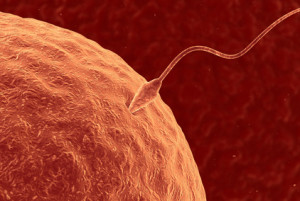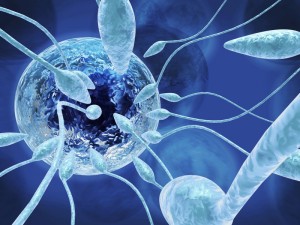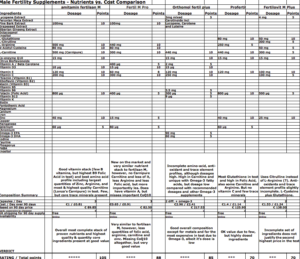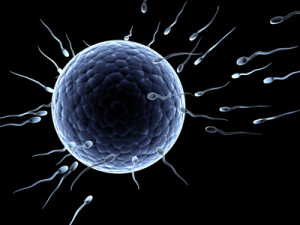Contents
Fertility
[tube]rTnViNgJEzU[/tube]
The fertility of men and women has dropped dramatically over the last 50 years. It has been estimated that 15% – 20% of couples fail to conceive despite over six months of regular sexual intercourse.
The causes for infertility are not primarily due to women, but are spread across both sexes:
- About 40% of the causes are found in men
- About 40% of the causes are found in women
- In around 20% of cases it is due to impairments in both partners
Male Fertility
The female cycle, sperm production, the cell maturation and ovulation are all extremely complex processes and dysfunction can therefore easily occur. It is believed that the two main causes for the sharp rise in infertility are:
- Environmental toxins,
- Deficiency of micronutrients (amino acids, vitamins, trace elements and minerals)
Environmental toxins are pesticides, air pollutants and poisons, which we voluntarily expose ourselves to. These include nicotine, alcohol and drugs. Something all environmental toxins have in common in addition to their direct potential harm is that they contribute to a deficiency in micronutrients and antioxidants. Other causes include infections and the increased levels of oestrogen in the diet and drinking water.
Looking at the supply of micronutrients in relation to a planned pregnancy, it is not just a matter of ‘pregnant‘ or ‘not pregnant‘. When it comes to an actual pregnancy, it becomes a question of ‘healthy pregnancy with optimal conditions for the unborn‘ or ‘risky pregnancy‘.
Amino acids and male fertility
Carnitine is an amino acid that helps the body turn fat into energy. Therefore, L-carnitine is an essential part of both the development and ability to swim of human sperm cells.
In various studies it has been demonstrated thatdi low carnitine levels are associated with poor sperm count (oligozoospermia).
L-carnitine is directly related to the maturation and development of healthy sperm:
- High concentrations of L-carnitine in the epididymis support the developmental process of the spermatozoa.
- L-carnitine is essential to provide the sperm with energy.
- L-carnitine directly influences positive sperm motility and development, as demonstrated in several studies 1, 2, 3.
- As an antioxidant carnitine protects the sperm directly from cell damage and may increase the number of healthy sperm.
L-arginine
The body can only produce the neurotransmitter NO (nitric oxide) from the amino acid L-arginine. NO is responsible for the control of vascular tone. For men, this means that for a good erection, sufficiently high L-arginine levels must be present in the blood. Therefore L-arginine is recommended for men with erectile dysfunction .
L-arginine affects both erectile function and the quality of sperm:
- L-arginine is a direct precursor of spermine and spermitin. As early as 1973 it was found in a study of 173 men that the administration of 4,000 mg L-arginine on a daily basis in 74% of men significantly increased numbers of sperm and sperm mobility 4.
- Men with low sperm count (oligospermia) or no sperm (azoospermia) have a lower than average concentration of L-arginine in their ejaculations. 5.
- The sperm motility can be significantly improved by taking L-arginine over a period of six months. Additionally L-arginine has no known side effects 6.
L-glutathione
Glutathione is one of the most powerful antioxidants active in the human body and the only one, which works inside the cell.
Clinical studies have established a clear link between low seminal plasma glutathione levels and abnormal sperm parameters7.
Preliminary research suggests that glutathione supplementation may help to elevate male fertility by protecting spermatozoa. More clinical trials are necessary.
Popular products
Some of the most popular male fertility supplements, which include the above amino acids Carnitine, Arginine and Glutathione are
- aminoexpert fertil M PRO (forum and product reviews)
- amitamin fertilsan M (forum and product reviews here, and here)
- Orthomol fertil plus.
You can read a direct comparison of the top male fertility products here.
Other important nutrients
Zinc

click on the image to buy this top Arginine, Carnitine and Pine Bark Extract formula for better circulation and more testosterone
Zinc is a mineral that is especially important for the production of healthy sperm. Over 200 different metabolic processes have been identified to be unable to work without zinc.
Zinc among other things increases levels of testosterone. In a variety of studies, the intake of zinc has lead to a rise in number and mobility of sperm 8, 9.
Coenzyme Q10
Coenzyme Q10 is a vitaminoid with strong antioxidant properties. It is concentrated in the middle piece of the sperm; energy for movement is dependent upon the availability of Q10.
The ingestion of 50 mg of coenzyme Q10 per day lead to a significant increase in sperm motility in one study.10 Coenzyme Q10 is also known as an effective anti-aging vitamin.
Fertility Foods and Supplements
This popular youtube video explains very well which nutrients will improve male fertility and which foods and food supplements most effectively provide them.
[tube]BBmOxjdZ1ag[/tube] Male fertility has more than halved in recent years. However, treatment is available, the first step of which is semen analysis.
A comprehensive semen analysis, referred to as spermiogram, constitutes an important step towards assessment of male virility and fertility.
The semen analysis is not a hard” fertile or infertile, “diagnosis, but rather is seen as a benchmark for acceptable, normal sufficient male fertility.
Even men with values below the reference values may well have children.
Popular products
Some of the most popular male fertility supplements, which include the above amino acids Carnitine, Arginine and Glutathione are
- aminoexpert fertil M PRO (forum)
- amitamin fertilsan M (forum and product reviews),
- Orthomol fertil plus.
You can read a direct comparison of the top male fertility products here.
Female fertility
Often women try by all means to prevent pregnancy for more than two decades. Then when they are ready to conceive, they can hardly come fast enough.
However women often overlook that the natural fertility decreases with age:
- At 25, the statistical chance is of getting pregnant is 30% per cycle;
- From the age of 30 this probability decreases gradually. At 35, the probability is 15% per cycle and
- at the age of 40, the probability of becoming pregnant is only 10% per cycle
To increase fertility, antioxidant vitamins, coenzyme Q10 and L-carnitine have been shown in several studies to be very promising.
Amino acids and vitamins during pregnancy and lactation
 Many micronutrients influence fetal health considerably especially in the first weeks of pregnancy. The best known are:
Many micronutrients influence fetal health considerably especially in the first weeks of pregnancy. The best known are:
- Folic acid: More than half of the Western European population has a deficiency of folic acid. A folic acid deficiency in the first weeks of pregnancy considerably increases the risk of neural tube defects (“open back”). Folic acid should therefore be regularly taken in any case well before a planned pregnancy.
- Omega-3 fatty acids: Through daily supplementation with omega-3 fatty acids, the risk of allergies can be reduced. 11. Also, there are studies that provide evidence that omega-3 fatty acids strengthen the immune system, reduce the risk of cancer, and increase intelligence.
- Vitamin D: There is a general deficiency of vitamin D in Western Europe. This can be attributed to the fact that Europe experiences many months with only small amounts of sunshine. British researchers have established the connection between various childhood diseases and vitamin D deficiency and recommend that pregnant women should supplement their diet with vitamin D [4].
Sexual Prowess and Testosterone Boosting
Erectile function tends to decrease with increasing age and naturally dropping testosterone levels. This represents a major challenge for men and indeed their partners as it impacts their life in both physical and psychological ways. Mid- and long-term dysfunctions are almost always caused by circulation-based problems. They must be examined by doctors to exclude the possibility of more serious conditions.
Physiologically, the most common cause is calcification of arteries and vanes. This leads to a reduction in circulation and as a result less effective blood flow into the penis’ cavernous (spongy) body. This causes a progressively weaker erection. In addition, however, psychological factors such as stress and anxiety can play also a major role.
Several peer-reviewed studies have demonstrated how amino acids, in particular Arginine are able to contribute effectively improve erectile function. The best results were achieved when Arginine was combined with Pine Bark Extract.
These two nutrients act synergistically by increasing the production of Nitrogen Oxide (NO) whilst reducing inflammation and preserving blood vessels. This enabled them to relax effectively, increasing blood flow into the penis and eliminate back flow.
In addition, some food supplement such as VIGARIN by a company called aminoexpert combine amino acids with several other common nutrients, which may boost testosterone.
- Matalliotakis I, Koumantaki Y, Evageliou A, Matalliotakis G, Goumenou A, Koumantakis E. L-carnitine levels in the seminal plasma of fertile and infertile men: correlation with sperm quality. International Journal of Fertility and Women’s Medicine. 2000. 45(3):236-240. Available from: https://www.ncbi.nlm.nih.gov/pubmed/10929687 ↩
- Costa M, Canale D, Filicori M, D’Iddio S, Lenzi A. L-carnitine in idiopathic asthenozoospermia: a multicenter study. Italian Study Group on Carnitine and Male Infertility. Andrologia. 1994. 26(3):155-159. Available from: https://www.ncbi.nlm.nih.gov/pubmed/8085668 ↩
- Lenzi A, Lombardo F, Sgro P, Salacone P, Caponecchia L, Dondero F, Gandini L. Use of carnitine therapy in selected cases of male factor infertility: a double-blind crossover trial. Fertility and Sterility. 2003. 79(2):292-300. Available from: https://www.fertstert.org/article/S0015-0282(02)04679-4/pdf ↩
- Hyppönen E, Boucher BJ. Avoidance of vitamin D deficiency in the United Kingdom: the case for a unified approach in national policy. British Journal of Nutrition. 2010. 104(3):309-314. Available from: https://www.ncbi.nlm.nih.gov/pubmed/20594390 ↩
- Papp G, Grof J, Molnar J, Jambor E. Importance of arginine content and arginase activity in fertility. Andrologia. 1979. 11(1):37-41. Available from:https://www.ncbi.nlm.nih.gov/pubmed/420414 ↩
- Scibona M, Meschini P, Capparelli S, Pecori C, Rossi P, Menchini Fabris GF. L-arginine and male infertility. Italian Journal of Urology and Nephrology. 1994. 46(4):251-253. Available from: https://www.ncbi.nlm.nih.gov/pubmed/7701414 ↩
- Lenzi A, Culasso F, Gandini L, Lombardo F, Dondero F. Placebo-controlled, double-blind, cross-over trial of glutathione therapy in male infertility. Human Reproduction. 8(10):1657-67. Available from:https://www.ncbi.nlm.nih.gov/pubmed/8300824 ↩
- Netter A, Hartoma R, Nahoul K. Effect of zinc administration on plasma testosterone, dihydrotestosterone, and sperm count. Archives of Andrology. 1981. 7:69-73. Available from: https://www.ncbi.nlm.nih.gov/pubmed/7271365 ↩
- Tikkiwal M, Ajmera RL, Mathur NK. Effect of zinc administration on seminal zinc and fertility of oligospermic males. Indian Journal of Physiology and Pharmacology. 1987. 31:30-34. Available from: https://www.ncbi.nlm.nih.gov/pubmed/3666872 ↩
- Lewin A, Lavon H. The effect of coenzyme Q10 on sperm motility and function. Molecular Aspects of Medicine. 1997. 18 S213-S219. Available from: https://www.ncbi.nlm.nih.gov/pubmed/9266524 ↩
- De Quelen F, Chevalier J, Rolli-Derkinderen M, Mourot J, Neunlist M, Boudry G. n-3 polyunsaturated fatty acids in the maternal diet modify the postnatal development of nervous regulation of intestinal permeability in piglets. Journal of Physiology. 2011. 589(17):4341-4352. Available from: https://www.ncbi.nlm.nih.gov/pubmed/21746785 ↩





